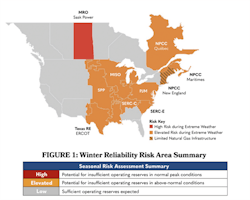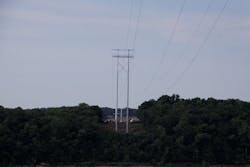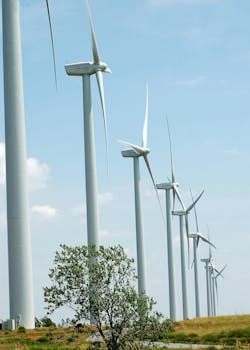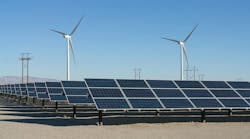The reliability of the grid is in the spotlight as electric utilities across the nation learn lessons from extreme winter weather events, rising energy demand and fuel supply issues. With winter weather upon us, reliable power is a priority for member-focused and community-driven utilities.
Recently, the nation’s grid monitor, the North American Electric Reliability Corporation (NERC), released a winter reliability assessment which revealed that two-thirds of the U.S. faces ‘elevated risk’ of blackouts in extreme winter conditions.
“This forecast again shows that our nation faces looming grid reliability challenges while demand for electricity continues to soar,” said Jim Matheson, CEO of the National Rural Electric Cooperative Association (NRECA), a trade organization that represents more than 900 electric cooperatives nationwide.
In 2021, the life-threatening Winter Storm Uri brought rolling blackouts to portions of Oklahoma. Although brief in nature, rolling blackouts were necessary to prevent the power grid from failing in a critical time when energy demand exceeded supply and reserves. The NERC report warns that “when electricity supplies become constrained, operators can face a simultaneous sharp increase in demand as electric heating systems consume more power in cold temperatures.”
“We have winterized our generation plants, secured firm fuel contracts, firm transmission paths and back-up fuel in case of natural gas supply interruption. We are committed to meeting the needs of our members,” said Ted Hilmes, CEO of KAMO Power, a generation and transmission cooperative based in Vinita, Oklahoma. “If we are not going to accept rolling blackouts as everyday life, reliability has to be brought back to the forefront and has to stay at the forefront.”
NRECA warns the Environmental Protection Agency’s (EPA) power plant proposal amplifies reliability challenges for an already stressed power grid. The proposal would mandate impractical emissions standards for coal and natural gas-fired plants, causing pre-mature closure of always-available generation, such as fossil-fuel plants, and mandating technologies that have not been developed or proven.
“We understand the need to reduce carbon, but we also understand we need to add dispatchable fossil fuel generation. Reliability concerns require us to do both. All fuel sources are important for reliability and affordability,” said Gary Roulet, CEO of Western Farmers Electric Cooperative based in Anadarko, Oklahoma. “We have many long-term power agreements to ensure adequate capacity and reserves for our members.”
Roulet added both coal and natural gas supplies for the upcoming winter season are considerably higher than last winter. Forecast for wind and solar output is more challenging due to the intermittent nature of these resources.
“In the short term, we could be at an increased risk of energy shortfalls, but there’s greater awareness of the issues at hand. More people are listening to the message and hopefully will take steps to fix it in the long term,” Roulet said.
Regional Winter Forecast
Two of three generation and transmission cooperatives that serve Oklahoma’s distribution electric cooperatives, Western Farmers Electric Cooperative and Golden Spread Electric Cooperative, are part of the Southwest Power Pool (SPP), a regional transmission organization. The other generation and transmission electric cooperative, KAMO Power, one of the owners of Associated Electric Cooperative, is a part of the Southeastern Electricity Reliability Council (SERC-Central), a regional reliability organization.
Reliability Treats
Extreme weather events
NERC: Over 20% of generating capacity has been forced off-line when freezing temperatures extend over parts of North America that are not typically exposed to such conditions.
Rising energy demand
Electric Power Research Institute (EPRI): achieving net-zero economywide emissions by 2050 could require generation capacity to increase by as much as 480 percent compared to what’s in place today.
Fuel supply issues
As always-available generation assets (fossil fuels) are taken offline, they’re being replaced with less capacity, no capacity or capacity that’s intermediate (renewables) and not always available.
Chris Meyers is the Executive Vice-President and CEO of the Oklahoma Association of Electric Cooperatives. He is responsible for providing a number of services to the state’s Electric Cooperatives including Safety and Loss Control programs, administering the Self-insured Worker’s Comp group pool, State legislative lobbying and bill tracking, and publication of Oklahoma Living magazine which reaches more than 358,000 homes and businesses each month.
Chris Meyers is a graduate of Kansas State University with a bachelor’s degree in electrical engineering and of the University of Oklahoma with an MBA. He is also a registered Professional Engineer in the State of Oklahoma. He began his career in the electric utility industry in 1985. In his 38-year career he has held of number of positions in utility operations, sales and marketing, and government affairs. He has been Executive Vice-President of the Oklahoma Statewide office since February of 2010.
Chris serves on the Board of Directors for Rural Enterprises of Oklahoma, Inc., and the Grand River Dam Authority. He lives in Arcadia, OK with his wife Lori and has 3 grown children.
Anna Politano is the director of public relations and communications at the Oklahoma Association of Electric Cooperatives based in Oklahoma City. She earned her bachelor’s degree in journalism from Cameron University in Lawton and earned a master’s degree in Media Management from the University of Missouri’s prestigious School of Journalism.





